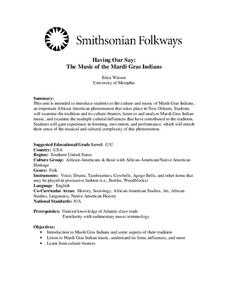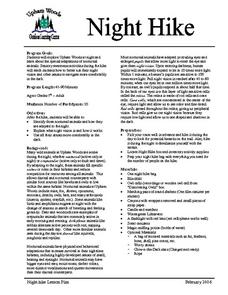Curated OER
Sunken Millions Animals
This PowerPoint includes a game with ocean graphics in which two teams answer increasingly difficult questions about animals. Topics covered include plant and animal cells, animal adaptation, and similarities and differences between...
Curated OER
Preying on Beans
Students act as predators searching for prey (beans) in two different settings to demonstrate the processes of adaptation and selection.
Curated OER
Vertebrate Dioramas
Learners are able to describe the development of their chosen form of vertebrate life from the past to the present in a four to six page typed paper. They explain the use of phylogenetic tree. Students use the phylogenetic tree to...
Curated OER
Vertebrate Dioramas
Young scholars describe the development of their chosen form of vertebrate life from the past to the present in a four to six page paper. They explain the use of a phylogenetic tree, and use this to exemplify an organism's evolutionary...
Curated OER
Evidence of Climate Change
Sixth graders examine climate change in the state of Colorado. In this climate lesson, 6th graders watch 2 video clips regarding the topic and research the subtopics- snow pack, precipitation, temperature, forest fires, river flow,...
Curated OER
I Have No Money, Would You Take Wampum
Students engage in a discussion about their experiences with goods, services, and money. In this bartering lesson, students read The Wampum Bird story and brainstorm their personal experiences with economics.
Curated OER
How Fire Affects Wildllife
For this ecology lesson, learners select an animal to study and read about how this animal adapts to ecological disaster. They complete 5 short answer questions after reading.
Curated OER
From Eggs to Frogs
Third graders receive a small container of tapioca pudding, they are to pretend that it is frog eggs. The students pretend they are birds who see the eggs, and eat some of them. They discuss what would happen if these were really frog...
Curated OER
Animals Multiple Choice Words Worksheet
Looking for some simple multiple-choice questions for an upcoming biology unit on animals? This worksheet features 7 clearly worded questions, each with 4 possible answers. Topics include adaptation, camouflage, ecosystems, animal...
University of Kentucky
The Great Spider Debate
Poor, misunderstood spiders! They are feared, disrespected, and detested by many people, yet they do so many positive things. A great addition to any insect unit, learn about some of the more common spiders, while hopefully dispelling...
Scholastic
Discussion and Dissection of an Owl Pellet
Young scientists get the chance to dissect pellets "owl" by themselves to determine the owls environment and nourishment. This is the third part of a three-part series.
Curated OER
Fall Similes
Fall is like a beautiful painting come to life—or is it more like an overflowing cornucopia? Practice writing similes with a activity on figurative language. As learners review simile structure, they come up with their favorite similes...
ARKive
Biodiversity and Evolution
Why is diversity in biology so important for an ecosystem? Explore biodiversity, evolution, and natural selection with a presentation for your biology class. It features clear information, activities for further understanding, and...
Smithsonian Institution
The Music of the Mardi Gras Indians
The traditions, costumes, and the music of the Mardi Gras Indians, African-Americans and those with African American or Native American Heritage are the focus of a unit that introduces class members to a little-known group that...
American Chemical Society
Exploring Energy
When asked to list everyday objects that require energy, most people list technology that use batteries or electricity. Through hands-on exploration, young scientists discover energy is much more than just circuitry. They play with...
Howard Hughes Medical Institute
Seed Dispersal in Tropical Forests
How do seeds get around? It's not like plants can control seed dispersal—or can they? Dig deeper into the amazing mechanisms of seed dispersal observed in tropical plants through interactives, a video, and plenty of hands-on data...
American Museum of Natural History
What's This? Colorful Creatures
An online resource shows learners some species that are very good at using their camouflage as well as other ways species use their coloring for survival. Interactive and digital, the lesson is perfect as a remote learning resource.
Curated OER
Alligator
Students create a model of an alligator out of clay using both artwork and research to guide their finished work.
Curated OER
Barn Owl
In this barn owl worksheet, students read four paragraphs of information about barn owls, and study a photograph. There are no questions here.
Curated OER
Coloration
Students conduct an experiment picking out colored vs. camoflauged toothpicks out of the grass. They list and describe different types of coloration and explain how coloration assists the great horned owl and the striped skunk survive.
Curated OER
Habitats
Young scholars are introduced to various animals and their habitats. In groups, they must determine which animal skin matches the correct animal and identify the texture. They discuss the reason for the texture and width of the skin to...
Curated OER
Discovering Owls
Students are introduced to different types of owls and owl pellets. They list several adaptations that benefit the owls. Students identify the various species of owl that live in Wisconsin. Students discuss owl pellets and identify the...
Curated OER
Night Hike
Students explore Upham Woods at night and investigate about the special adaptations of nocturnal animals. They identify three nocturnal animals and how they are adapted to the night. Students explain what night vision is and how it works.
Curated OER
Desert Animals
Students survive within an ecosystem, an animal must be physically and behaviorally adapted to the conditions of its environment.
Other popular searches
- Adaptations of Bird Beaks
- Science Bird Adaptations
- Animal and Bird Adaptations
- Baby Bird Adaptations
- Bird Adaptations Behavior
- Bird Adaptations Behaviour
- Bird Adaptations Galapagos
- Adaptations Bird Beak

























